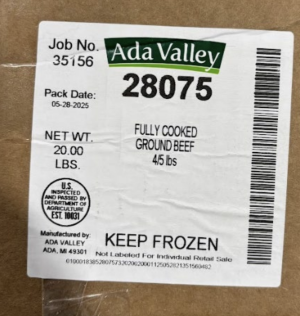Check your freezer: Ground beef recalled over possible metal contamination
By
Veronica E.
- Replies 0
If you’ve stocked up on frozen ground beef recently, now’s the time to check the label.
A new recall has been issued after a consumer found metal fragments in a batch of fully cooked beef distributed across five states.
While no injuries have been reported, the USDA is urging institutions and consumers to take action.
The recall involves more than 1,000 pounds of meat, and it may still be sitting in freezers at homes, schools, or other facilities.
If you have ground beef in your freezer, here’s what to look for.

What products are being recalled?
The recall affects fully cooked, frozen ground beef produced by the Ada Valley Meat Company.
The beef was shipped in 20-pound cardboard cases to distributors and food service providers in five states.
You’ll want to look for these key details:
If you see either of these codes on a package in your freezer, it’s best not to take any chances.
Also read: Recall notice for a favorite cereal—did you buy the affected batch?
How did this issue come to light?
The contamination was discovered after a consumer complaint, prompting the company and USDA to investigate.
The complaint revealed the presence of metal fragments in the meat.
While no confirmed injuries have been reported, metal in food can cause serious harm—including broken teeth, choking, or internal injury if swallowed.
That’s why the USDA’s Food Safety and Inspection Service (FSIS) issued a Class I recall, its most urgent category.
Authorities are especially concerned that the product may still be in commercial or institutional freezers.
Also read: Check your pantry: Popular canned fruit recalled over heavy metal contamination
What should you do with the recalled beef?
If you find the affected product in your freezer, take these steps right away:
Even if you’ve already stored or cooked the meat, if the lot code and date match, it should not be consumed.

Also read: Is your favorite snack in danger? FDA issues urgent recall warning!
Why does this happen?
Metal contamination in food typically results from equipment malfunctions during the grinding, packaging, or sealing process.
Even with modern food safety systems, occasional breakdowns can allow small fragments to pass through undetected.
When a customer finds something unusual and reports it, that complaint can trigger a recall—often helping others avoid potential harm.
Also read: RECALL ALERT: This grocery store favorite is being pulled from shelves after a surprising discovery
Metal-in-food recalls are becoming more common
This isn’t the only metal-related recall this year.
Earlier in 2025, another brand had to pull snack sticks off shelves for the same reason, and several other packaged food items have also been affected.
While these incidents are rare, they highlight the importance of quality control—and of speaking up when something seems off.
Your report could help prevent an injury or lead to a broader investigation.
Also read: Massive recall issued for popular 4x4 trucks over a serious safety hazard–Find out if yours is affected!
How to protect yourself and others
Recalls like this can be unsettling, but they serve an important purpose in keeping our food supply safe.
A quick label check today could prevent a serious health risk tomorrow.
Read next: Is a deadly substance lurking in your blood pressure medication? Urgent recall announced!

Here at The GrayVine, we understand how unsettling recalls can be—especially when you’re feeding loved ones or managing a community kitchen.
Have you had a similar experience? How do you stay organized and safe when storing frozen foods? Share your insights, stories, or questions with our community in the comments below.
A new recall has been issued after a consumer found metal fragments in a batch of fully cooked beef distributed across five states.
While no injuries have been reported, the USDA is urging institutions and consumers to take action.
The recall involves more than 1,000 pounds of meat, and it may still be sitting in freezers at homes, schools, or other facilities.
If you have ground beef in your freezer, here’s what to look for.

Recent recalls highlight the importance of checking labels and staying alert to food safety warnings. Image Source: Pexels / Luis Kuthe.
What products are being recalled?
The recall affects fully cooked, frozen ground beef produced by the Ada Valley Meat Company.
The beef was shipped in 20-pound cardboard cases to distributors and food service providers in five states.
You’ll want to look for these key details:
- Pack date: May 28, 2025 — Lot code 35156
- Pack date: May 30, 2025 — Lot code 35157
If you see either of these codes on a package in your freezer, it’s best not to take any chances.
Also read: Recall notice for a favorite cereal—did you buy the affected batch?
How did this issue come to light?
The contamination was discovered after a consumer complaint, prompting the company and USDA to investigate.
The complaint revealed the presence of metal fragments in the meat.
While no confirmed injuries have been reported, metal in food can cause serious harm—including broken teeth, choking, or internal injury if swallowed.
That’s why the USDA’s Food Safety and Inspection Service (FSIS) issued a Class I recall, its most urgent category.
Authorities are especially concerned that the product may still be in commercial or institutional freezers.
Also read: Check your pantry: Popular canned fruit recalled over heavy metal contamination
What should you do with the recalled beef?
If you find the affected product in your freezer, take these steps right away:
- Do not serve or eat it.
- Safely discard the beef or return it to the place of purchase if possible.
- Contact Ada Valley Gourmet Foods with questions at: [email protected].
Even if you’ve already stored or cooked the meat, if the lot code and date match, it should not be consumed.

Boxes like this one—with lot code 35156 and pack date May 28, 2025—are part of the current ground beef recall. Image Source: USDA.
Also read: Is your favorite snack in danger? FDA issues urgent recall warning!
Why does this happen?
Metal contamination in food typically results from equipment malfunctions during the grinding, packaging, or sealing process.
Even with modern food safety systems, occasional breakdowns can allow small fragments to pass through undetected.
When a customer finds something unusual and reports it, that complaint can trigger a recall—often helping others avoid potential harm.
Also read: RECALL ALERT: This grocery store favorite is being pulled from shelves after a surprising discovery
Metal-in-food recalls are becoming more common
This isn’t the only metal-related recall this year.
Earlier in 2025, another brand had to pull snack sticks off shelves for the same reason, and several other packaged food items have also been affected.
While these incidents are rare, they highlight the importance of quality control—and of speaking up when something seems off.
Your report could help prevent an injury or lead to a broader investigation.
Also read: Massive recall issued for popular 4x4 trucks over a serious safety hazard–Find out if yours is affected!
How to protect yourself and others
- Stay informed. Sign up for USDA and FDA food recall alerts or check their websites regularly.
- Inspect your freezer. Especially if you buy in bulk or cook for large groups.
- Warn others. If you think a friend, family member, or organization may have purchased the affected product, let them know.
- Report concerns. If you find something questionable in your food, contact both the manufacturer and USDA. Every report matters.
Recalls like this can be unsettling, but they serve an important purpose in keeping our food supply safe.
A quick label check today could prevent a serious health risk tomorrow.
Read next: Is a deadly substance lurking in your blood pressure medication? Urgent recall announced!
Key Takeaways
- Ada Valley Meat Company has recalled over 1,000 pounds of fully cooked frozen ground beef due to metal contamination discovered in a consumer complaint.
- The affected products have pack dates of May 28 (lot code 35156) and May 30 (lot code 35157) and were shipped to food service providers in five states.
- No injuries have been reported, but the USDA warns the product may still be stored in institutional or home freezers.
- Consumers should avoid serving the beef, discard it or return it, and can contact the company for more information or concerns.
Here at The GrayVine, we understand how unsettling recalls can be—especially when you’re feeding loved ones or managing a community kitchen.
Have you had a similar experience? How do you stay organized and safe when storing frozen foods? Share your insights, stories, or questions with our community in the comments below.






